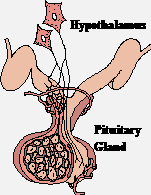Hyperprolactinemia refers to the excess secretion of prolactin a hormone that promotes milk production for breast-feeding.

Prolactin is a protein hormone that is made by the pituitary gland. The pituitary gland is a small, pea-sized gland that sits at the base of our brain in the middle of our head. It secretes 8 major hormones including Growth Hormone (GH), Follicle Stimulating Hormone (FSH), Luteinizing Hormone (LH), Thyroid Stimulating Hormone (LH), Adrenocorticotrophic Hormone (ACTH), oxytocin and vasopressin, in addition to prolactin. Under normal conditions, prolactin is secreted in increasing amounts after the delivery of a baby to facilitate milk production. This also results in the reproductive system becoming inactive. From an evolutionary standpoint, this design allows the mother to nourish the child before she can become pregnant again.
There are a variety of potential causes for excess prolactin secretion. The most common cause is excess activity by the prolactin secreting cells (the lactotrophes). Also common are tumors of the lactotrophes. These tumors are usually very small and are almost universally benign. Other hormonal problems can cause hyperprolactinemia including an under active thyroid gland (hypothyroidism), polycystic ovary syndrome and an overactive adrenal gland (Cushing’s Disease). Certain medicines can cause prolactin to be elevated including some anti-depressants (tricyclics), some anti-hypertensives (calcium channel blockers), narcotic pain medications, estrogen containing drugs and some anti-psychotic medications. Excess breast manipulation, high protein meals, physical activity and sleep deprivation can artificially elevate the prolactin levels. Rarely, there are brain tumors that block the signals from the hypothalamus to the pituitary gland that can result in elevated prolactin levels.
Inappropriate secretion of prolactin can cause a variety of problems. First, the breast can be activated and secrete milk. The presence of this discharge is called galactorrhea. Secondly, menstrual irregularities can occur, ranging from subtle problems to irregular cycles to no periods at all. This can result infertility as well as in menopausal like effects including bone loss, hot flushes, decreased sex drive, and vaginal dryness. Neurologic problems can also be present (e.g. headaches, vision problems, facial pain) if tumors of significant size are the cause.
Your doctor will obtain several blood tests after interviewing you and examining you. These will include a prolactin level and a TSH level. These tests should be done in the morning, prior to any significant meals. You may also be asked to have an MRI of your hypothalamus and pituitary gland done. Other testing will depend upon your history.
Treatment of excess prolactin secretion depends on the cause. The goals of treatment include decreasing the prolactin level as well as correcting any other abnormalities that may be present. The remainder of this section will deal with the treatment of hyperprolactinemia caused by excess activity of the lactotrophes or by tumors of the lactotrophes, since these are the most common causes.
Treatment of hyperprolactinemia can be medical or surgical, with medical treatment the first choice. This involves using drugs that are similar to the neurotransmitter dopamine (remember, dopamine normally slows prolactin secretion). These drugs include bromocryptine (Parlodel), pergolide (Permax), and cabergoline (Dostinex). Bromocryptine has been used the longest and is the most established of these medicines. Side effects of these drugs include nausea, dizziness, headaches and constipation. If the medicines are not well tolerated orally, they can be taken vaginally and be just as effective. Usually treatment is long term and is very effective. All are considered Category B in pregnancy, which suggest they are safe to use if needed.
When medical treatment is not successful for the pituitary tumors, surgical treatment can be very effective. However, there can be a significant recurrence rate for the tumors when treated surgically. Fortunately, surgical therapy is rarely needed.
Advanced Reproductive Medicine & Gynecology of Hawaii
Helping to Create New Beginnings